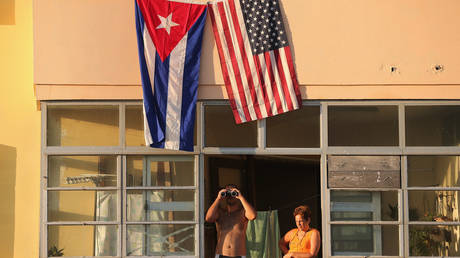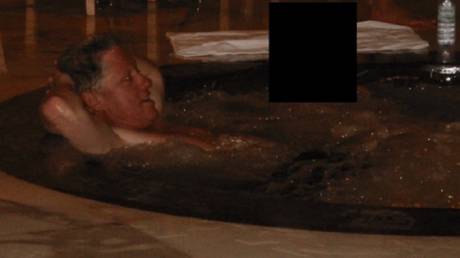
Truckers tell RT that, far from being an extremist event, the Freedom Convoy protest has brought Canadians from all walks of life together
Canada’s Freedom Convoy is mired in controversy. Some see the protest against Covid restrictions and vaccine mandates as an essential stand for liberty. Others have dismissed it as an opportunity for right-wing zealots to sow the seeds of chaos, with stories of swastikas and Confederate flags being openly displayed.
The way events have unfolded has been dramatic. Since the convoy got underway on January 22, the capital city, Ottawa, has been declared a state of emergency, with Prime Minister Justin Trudeau and his family fleeing to a secret location due to security concerns, as thousands of truckers converged on Parliament Hill. The PM has been hugely critical of the protest, saying, “There is no place in our country for threats, violence or hatred.
The drama continued to unfold, with fuel for the truckers seized by police and a judge granted a 10-day injunction banning truckers honking their horns. Even the crowdfunding effort turned sour as GoFundMe refunded $10 million that had flooded in, due to concerns over violence.
Now, similar scenes are happening across Canada, with protest sites set up at various US border points and other cities. But why is this happening? Is there more to it than anger at vaccine mandates? And what is the experience like for those at the heart of the convoy?
Sitting in his rig, about to load 90,000 pounds of steel coil, 39-year-old Adam Stirr from Niagara, Ontario said he was overwhelmed by the support he had received, having been housed by a local family for a week.
He told RT, “They homed me and fed me. I used their shower, they gave me a bed, they even fed me vegan food – and they are not vegan. Who lets a random truck driver into their house? This has been a mind-blowing experience of kindness, love and unity. It’s an absolute shame our government is, for whatever reason, trying to crush it so badly.”
Stirr went to Ottawa and parked his truck outside Parliament after being spurred into action by a close friend. “He’s been a private investigator for 25 years, and risks losing his job because of these mandates,” he explained. “He works by himself and doesn’t come into any contact with the public. There’s no reason for it.”
Once in the capital, Stirr was surprised at the scale of the distress and anger. “People were coming up to me crying, telling me their children had committed suicide, their whole families had lost their jobs, they are losing their homes,” he continued. “People’s lives are being destroyed by these mandates.
“I have some really serious doubts about the condition of our democracy here. This is a very critical time for our nation. The legacy media … the big media corporations … they are all towing this mainstream narrative, working in cahoots with [the]government to crush this and painting it as a hate event.”
Stirr had to leave Ottawa after his insurance company was contacted – he suspects by the police – and he was in danger of losing his employment. But he feels so strongly about the protest, he has vowed to return without his truck.
Equally determined is 42-year-old Elizabeth Hoerdt, a trucker since 2004, who is almost 3,800 kilometers away in Alberta. She spent several nights at the Coutts border crossing with the US and was inspired by the defiance of her fellow protestors.
Hoerdt told RT, “Before this, I had never attended a protest in my life. I heard about Coutts and headed down. It was so exhilarating, I couldn’t leave. Me and my daughter packed up our truck and spent four days down there, hippie style.”
During our interview, her 16-year old daughter Shaelynn joined the conversation, eager to be part of something that is resonating with her generation. It’s a concern for young people that Hoerdt, a single mother of four, is particularly motivated by.
“The main fuel for me is the next generation, like my children and everybody else’s children. What they are doing to these kids is starting to affect their mental health,” she said.
“I have twin 16-year old daughters and putting them in isolation, taking their sports [away]… It hit hard for me as they are going to counseling and are really affected by it. They have changed, they are not the same wonderful human beings they were two years ago.”
In January, mandates were introduced so truckers had to be jabbed to enter the US and come back into Canada. Both Stirr and Hoerdt are vaccinated against Covid-19, but neither is happy.
Hoerdt explained why. “They are not making it our choice anymore. It’s getting forced on us, you cannot work, you cannot leave the country and they are talking about province to province now. I’m fully vaccinated because I had to [be]. I had no choice if I wanted to work. But I’m not getting a booster. I am not complying anymore. It should be over.”
While the truckers’ concerns are legitimate, how do they feel about fringe groups jumping on their bandwagon? There is no question that pictures of Nazi symbols and the Confederate flag have impacted public perception.
Stirr says a bit of perspective is required. “I rolled into Ottawa with my best friends, two black men, and we heard the rumors and saw the swastika flag pictures. I was there for over a week and the only person I actually physically saw myself was the one guy who came to the Hill with the Confederate flag with his face completely covered. He got booted off that hill in three or four minutes. The whole crowd was like, ‘You are out, as that’s not cool’ and he walked off.
“When I was walking around the convoy in downtown Ottawa, every segment of Canadian society was represented; every colour, ethnicity, religion, transgender folks, everybody was getting along. It was the most beautiful display of unity I’ve ever seen in my entire life.”
Some truckers feel those pictured with the hate flags and symbols have been planted, in an attempt to discredit the truckers. There’s a strong feeling of mistrust with the authorities.
Stirr noticed cell phone reception dropping in Ottawa, claiming, “It’s been very sporadic, I did one interview that went well and I went to do a second interview the next night and it cut off after about two minutes as there was no internet service.
“I don’t know if that was from overload or if they are purposely trying to slow down or stop people live streaming and providing actual footage from the ground. Also, Facebook censored me from going live, probably within an hour of me notifying them I was going to be attending an event. I haven’t been able to live stream from my account as they censored me right away.”
While some will dismiss the idea of a phone network being manipulated in a democratic nation like Canada, Hoerdt claimed that the police told her it’s happening. She said, “Some really nice police officers came and had a coffee with us, and were saying there were two cops in the blockade just to scramble cell phones. That was their job.”
According to her, 80 tickets were issued to drivers in just one day at the border blockade, “for things like impeding traffic, [non-working] brake lights, obstruction of view because of your flag, cracked windshields … they were just looking for anything and it’s sad. I’m scared right now: We need to be heard and they are just shutting us up.”
Another area of mistrust is with the mainstream Canadian media. RT approached several truckers who didn’t want to talk about their cause, which appears at odds with their campaign, because of dissatisfaction with the media in general.
Stirr admitted, “A lot of people now are very mistrustful of media outlets specifically because of lies that have been told by the legacy media here in Canada. People have been seeing the live feeds and then they are seeing what the news is saying, and it couldn’t be further apart from each other.”
The convoy is about to mark two weeks of protests in Ottawa and around Canada, and shows no signs of ending. It’s sparked similar gatherings across the world, and with the truckers’ resolve stiffening, it appears the only resolution can come from the government.
What would Stirr say to Justin Trudeau to make him understand the strength of feeling?
“I would just sit down and tell him some of these stories people told me and ask him: ‘How can you sit here and do this to people? And can we please stop now, this really needs to end’. It’s ending all over the world, it’s time for us to join with everybody else and end this madness.”
Hoerdt also remains committed and has plans to make the long trip to Ottawa to join in there.
In a perverse way, she actually feels gratitude toward Canada’s under-fire leader. “I would tell him ‘Thank you, you have brought our country back together by dividing us’. I would tell him you’ve really opened all of our eyes.”
For Hoerdt, the moral battle is over. “I think we’ve sort of won already with the way everyone is unified. I just want to be free again. I’ve got a few critics in my life right now who say I’m absolutely insane but I’m Gen X – I think we were trained to do this and wherever I need to be, I’m not giving up.”




